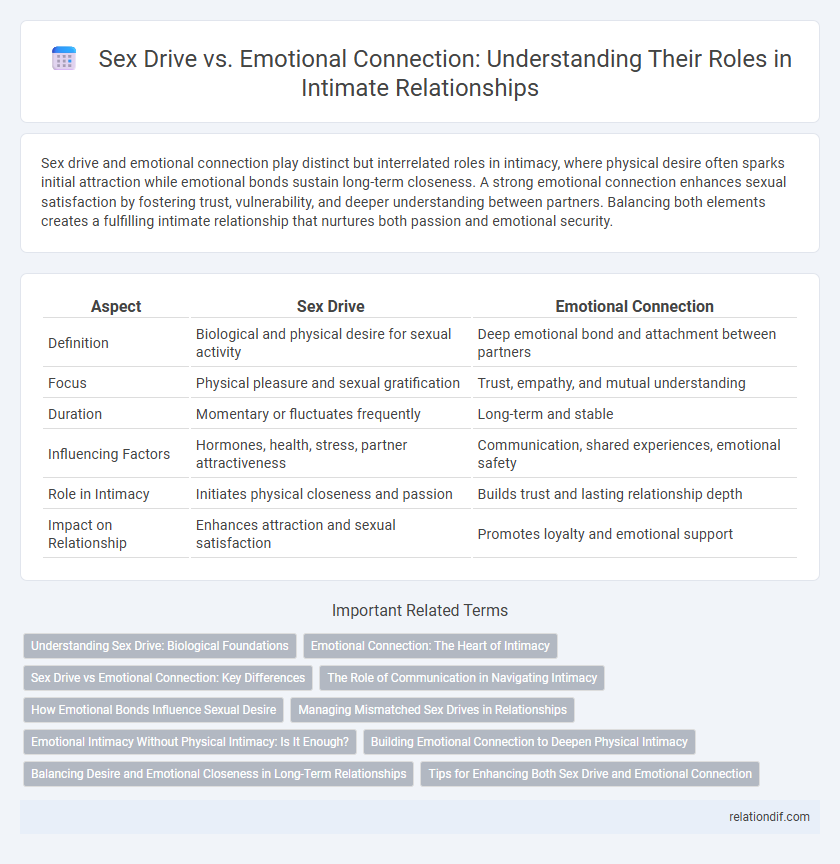Sex drive and emotional connection play distinct but interrelated roles in intimacy, where physical desire often sparks initial attraction while emotional bonds sustain long-term closeness. A strong emotional connection enhances sexual satisfaction by fostering trust, vulnerability, and deeper understanding between partners. Balancing both elements creates a fulfilling intimate relationship that nurtures both passion and emotional security.
Table of Comparison
| Aspect | Sex Drive | Emotional Connection |
|---|---|---|
| Definition | Biological and physical desire for sexual activity | Deep emotional bond and attachment between partners |
| Focus | Physical pleasure and sexual gratification | Trust, empathy, and mutual understanding |
| Duration | Momentary or fluctuates frequently | Long-term and stable |
| Influencing Factors | Hormones, health, stress, partner attractiveness | Communication, shared experiences, emotional safety |
| Role in Intimacy | Initiates physical closeness and passion | Builds trust and lasting relationship depth |
| Impact on Relationship | Enhances attraction and sexual satisfaction | Promotes loyalty and emotional support |
Understanding Sex Drive: Biological Foundations
Sex drive, or libido, is primarily influenced by biological factors such as hormonal levels, neurotransmitter activity, and genetic predispositions, which regulate sexual desire independently of emotional connection. Testosterone plays a key role in modulating sex drive in both men and women, while dopamine and serotonin affect the brain's reward and pleasure systems linked to sexual motivation. Understanding these biological foundations helps clarify why sexual desire can exist separately from emotional intimacy, emphasizing the complex interaction between physiology and emotional bonding in human relationships.
Emotional Connection: The Heart of Intimacy
Emotional connection forms the foundation of true intimacy, nurturing trust and vulnerability between partners. Unlike sex drive, which is primarily physical and fluctuates, emotional bonds create lasting closeness through shared experiences and deep understanding. Studies show couples with strong emotional intimacy report higher satisfaction and resilience in relationships.
Sex Drive vs Emotional Connection: Key Differences
Sex drive refers to the biological and physical desire for sexual activity, driven by hormonal and neurological factors that influence libido intensity. Emotional connection involves the psychological and relational bond between partners, fostering intimacy through trust, affection, and mutual understanding. Understanding the key differences between sex drive and emotional connection helps couples navigate their needs, balancing physical desire with emotional intimacy for a healthier relationship.
The Role of Communication in Navigating Intimacy
Open and honest communication plays a crucial role in balancing sex drive and emotional connection within intimacy. Expressing individual desires and emotions fosters mutual understanding and strengthens the bond between partners. Effective dialogue reduces misunderstandings, allowing both sexual needs and emotional closeness to coexist harmoniously.
How Emotional Bonds Influence Sexual Desire
Emotional bonds significantly enhance sexual desire by fostering trust and security between partners, which deepens intimacy and heightens physical attraction. Strong emotional connections activate brain regions linked to pleasure and attachment, intensifying sex drive beyond mere physical stimulation. Research shows couples with high emotional intimacy report greater sexual satisfaction and frequency, underscoring the critical role of emotional closeness in sustaining a healthy sex life.
Managing Mismatched Sex Drives in Relationships
Sex drive and emotional connection often influence each other but can vary independently in relationships, leading to mismatched desires. Managing these differences requires open communication, empathy, and negotiating intimacy needs that respect both partners' boundaries and feelings. Couples may benefit from exploring alternative ways to foster closeness, such as physical affection or emotional bonding activities, to maintain connection despite differing levels of sexual desire.
Emotional Intimacy Without Physical Intimacy: Is It Enough?
Emotional intimacy fosters trust, understanding, and a deep connection that can sustain relationships even without physical intimacy. Research shows that couples who prioritize emotional bonding often report higher relationship satisfaction despite variations in sex drive. While physical intimacy can enhance closeness, many individuals find that emotional connection alone provides sufficient fulfillment and stability in long-term partnerships.
Building Emotional Connection to Deepen Physical Intimacy
Building a strong emotional connection enhances sex drive by creating trust and vulnerability between partners, leading to more fulfilling physical intimacy. Emotional intimacy activates oxytocin release, which strengthens bonding and increases sexual desire naturally. Prioritizing open communication and shared experiences deepens emotional ties and positively impacts physical passion.
Balancing Desire and Emotional Closeness in Long-Term Relationships
Balancing sex drive and emotional connection in long-term relationships requires intentional communication and understanding of each partner's needs. Maintaining physical intimacy supports hormonal release, such as oxytocin and dopamine, which strengthens emotional bonds and enhances relational satisfaction. Prioritizing both desire and emotional closeness fosters resilience against relationship challenges and promotes mutual fulfillment.
Tips for Enhancing Both Sex Drive and Emotional Connection
Boosting sex drive and emotional connection involves consistent open communication to express desires and feelings honestly. Prioritizing regular physical touch, such as cuddling or gentle massages, helps stimulate intimacy hormones like oxytocin, enhancing bonding and desire. Scheduling quality time together without distractions fosters emotional closeness, which directly supports a healthier, more satisfying sex drive.
sex drive vs emotional connection Infographic

 relationdif.com
relationdif.com